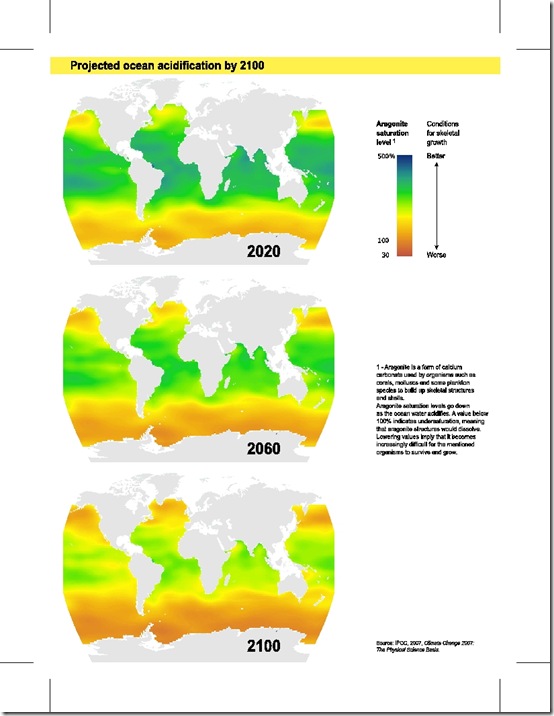I’m officially ceasing my sitting on the fence about greenhouse gases, but want to make a few things clear.
It is right to worry about greenhouse gases, and to worry quite a lot. For me, the most convincing reason for this is actually not directly the issue of global warming, which still carries uncertainty about its likely extent and its full consequences, but rather ocean acidification.
The recent
Scientific American article I posted about
here gives good reason to worry about the global situation if CO2 levels ever reach 1000 ppm. (Short explanation: if oceans or seas become sufficiently lacking in oxygen and warm enough, hydrogen sulphide producing bacteria might make enough gas to cause enormous deadly gas bubbles that could wipe out life on nearby land.) The problem is, as noted in my recent
post here, the world could get up to 700 ppm by the end of this century, and despite what the Scientific American article says, it would seem it need not take another century beyond that to crack 1,000ppm.
Going back and looking at
other articles on
ocean acidification, it seems to me that the environmental effects of that are relatively easy to test and accurately predict. (It doesn’t take much to set up a large tank and change the Ph and see what it does to plankton or coral shells.)
As plankton plays a significant role as a CO2 sink in the deep oceans, surface acidification to an extent that would cause a decrease in plankton would also seem to be a major worry for accelerating the rate of increase of atmospheric CO2.
The other issue that gives me concern is that letting CO2 levels get close to 1000 ppm may make it extremely easy for some uncontrollable event to lead to a sudden disastrous global increase. (For example, a
supervolcano system suddenly springing to life, or an asteroid hit or two. If I understand it correctly, anything that kicks up a lot of dust would initially cool the earth, but the greater greenhouse gases would eventually kick in.)
That’s my reasoning for deciding that there is not much point in nitpicking over the arguments about how much hotter increased CO2 levels may make the world. Seriously bad effects on the oceans seem certain with sufficiently high CO2 levels anyway.
Of course,
Phillip Adams and his ilk are in full gloating “told you so” mode about the fact that politicians on the the Right are starting to sound more serious about the issue. (It seems to me that Adams is wanting to take far more credit for early recognition of the issue than his published columns indicate he deserves.) My impression is that ocean acidification issue has really only started attracting a lot of attention in the last couple of years anyway.
Also, to be clear about my position, there are several things related to global warming of which I remain either dismissive or at least very sceptical:
1. the Kyoto Treaty;
2. wind power;
3. Carbon offset schemes which involve growing trees, especially if they are in areas where bushfires are a distinct possibility. (It is my suspicion that many companies promoting carbon offset schemes are selling snake oil when it comes to their long term effect.)
4. Environmentalists and politicians who claim Pacific Islands are already disappearing from increasing sea levels caused by global warming. (In another 30 years or so, maybe. But hey, just how viable is any 2 metre high island nation built in the middle of the ocean anyway.)
5. Politicians who resist nuclear power on principle.
6. Dismissal of the sun’s role as being possibly significant for temperatures over the next century.
7. Believing that the current Australian drought is necessarily related to global warming.
8. Arguing that current short bouts of surprising cooler weather are a sign that global warming is not true, and that greenhouse gases are not worth worrying about. (Sorry
Tim Blair, they are funny, but I think no serious climate scientist is concerned about them disproving the theory.)
9. “The Day after Tomorrow” scenarios to do with the
sudden “switching off” of the
Atlantic ocean conveyor current. (
Real Climate recently chided The Guardian for getting reporting of recent research on this completely wrong.)
10. The more
excitable predictions about the number of birds, frogs, spiders, polar bears etc likely to be lost as a result of global warming.
The fact that
Rupert Murdoch and me have suddenly reached the same conclusion is, of course, simply a sign that great minds think alike. He's a sharp old codger, isn't he?
